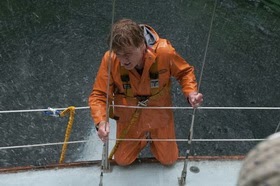Directed by
Martin Scorsese
7/10
Martin
Scorsese can do whatever he wants these days, but let’s consider this: the man
hasn’t made a truly great (no-questions-asked great) film since The Aviator. And that was in 2004. It’s
all part of an ongoing, dangerously soulless phase: Shutter Island was Scorsese getting technical about Dennis Lehane’s
novel, Hugo was Scorsese getting
technical about 3D, and The Wolf Of Wall
Street is Scorsese getting technical about entertainment. If anything –
he’s good at all those things.
 It’s just
that inside there is void.
It’s just
that inside there is void.
The man
knows how to entertain, and in that respect The
Wolf Of Wall Street is value for money . After the slick and dreary Hugo, we get this welcome adrenaline
rush of clever bullshit. The box office is incredible, the cinemas are
overcrowded, the critics are happy or at the very least hilariously outraged, and in the
course of three whopping hours Scorsese never lets go for one second. Golden
Globe saw it as a comedy movie, which almost makes sense. It’s not so much
funny (unless you will laugh at the scene where DiCaprio snorts cocaine out of
a hooker’s butthole) as great fun.
Overall, The Wolf Of Wall Street is a rather banal
proposition: Martin Scorsese making a big movie about money (all based on
Jordan Belfort’s equally opulent memoir), swindles and corruption, drugs and
extravagance, with Leonardo DiCaprio in the main role. I don’t even know how I
feel about seeing DiCaprio in yet another Scorsese film. Don’t get me wrong
though. If someone somewhere still thinks DiCaprio isn’t a great actor, I’ll be
the first in line to protest. He is a terrific actor, and he is terrific in this
film (actually a ‘movie’; this is where Aldous Huxley’s talkie-feelie-movie
snobbery should be dropped). I just think Scorsese should stop casting him with
such a blinding, unimaginative consistency. It’s getting formulaic.
DiCaprio
is the main guy: the Wall Street wolf who is actually a little too likable
for someone of that sort. Then there’s Matthew McConaughey (who is always good)
as the mentor, there’s Jonah Hill (whose role is mostly reduced to getting
stoned and pissed) as the friend and there’s Margot Robbie (obscenely
seductive, of course) as the girl. The acting is impeccable, you definitely
can’t fault that. Nor can you fault the brilliant scene where DiCaprio’s
character has to crawl after a particularly bad overdose. Nor any other scene
for that matter. The drugs are used, the money is swindled, the girls are shagged – what’s not to like. Well, maybe the fact that it gets a little too
repetitive after a while? Or the fact that it feels oh so derivative and
secondary for a director with that filmography? That Scorsese doesn’t have
anything to say – past what he said so effectively back in 1990?
The bottom
line then. Immoral, profane, vulgar – but in a rather intelligent way. For all
its flatulent and fatuous self-indulgence ,
it’s actually a masterful work. A pale shadow of Goodfellas – granted. Bloated and empty. All the same – The Wolf Of Wall Street is as close as
you can get to wasting three hours on something that is actually really bloody
good. After all (if you don’t mind a little blasphemy), wasn’t Citizen Kane that too? Bloated and
completely empty?..
 To me, reviewing this film is akin to writing about the
best work of my favourite classical composer. It should just be a list of
superlatives battling with each other for the top spot. Magnificent, overwhelming,
inspiring. Or I could just go for pathetic metaphors, and compare the
experience of watching The Great Beauty
to growing wings and flying over Rome on a clear day.
To me, reviewing this film is akin to writing about the
best work of my favourite classical composer. It should just be a list of
superlatives battling with each other for the top spot. Magnificent, overwhelming,
inspiring. Or I could just go for pathetic metaphors, and compare the
experience of watching The Great Beauty
to growing wings and flying over Rome on a clear day. 









